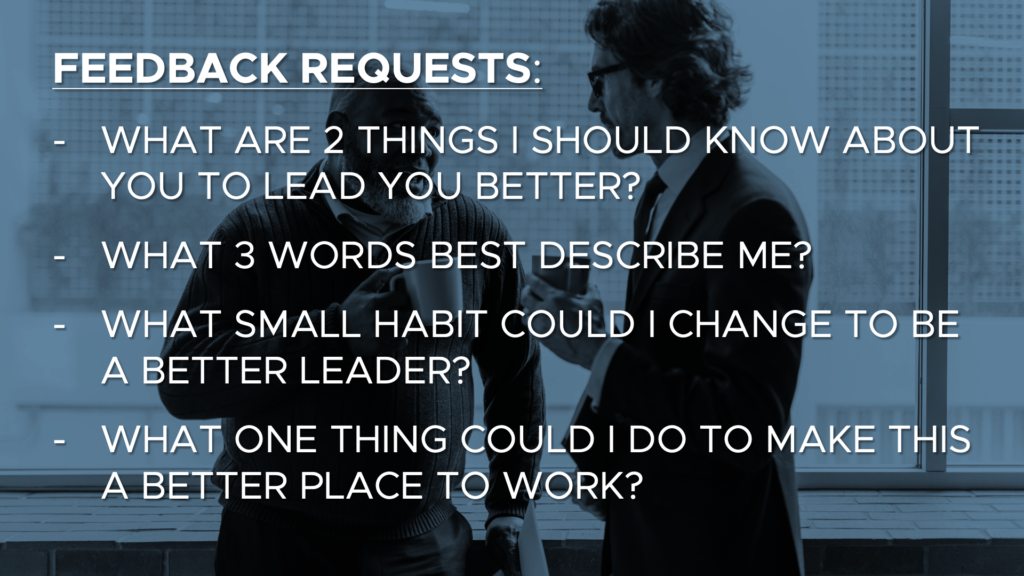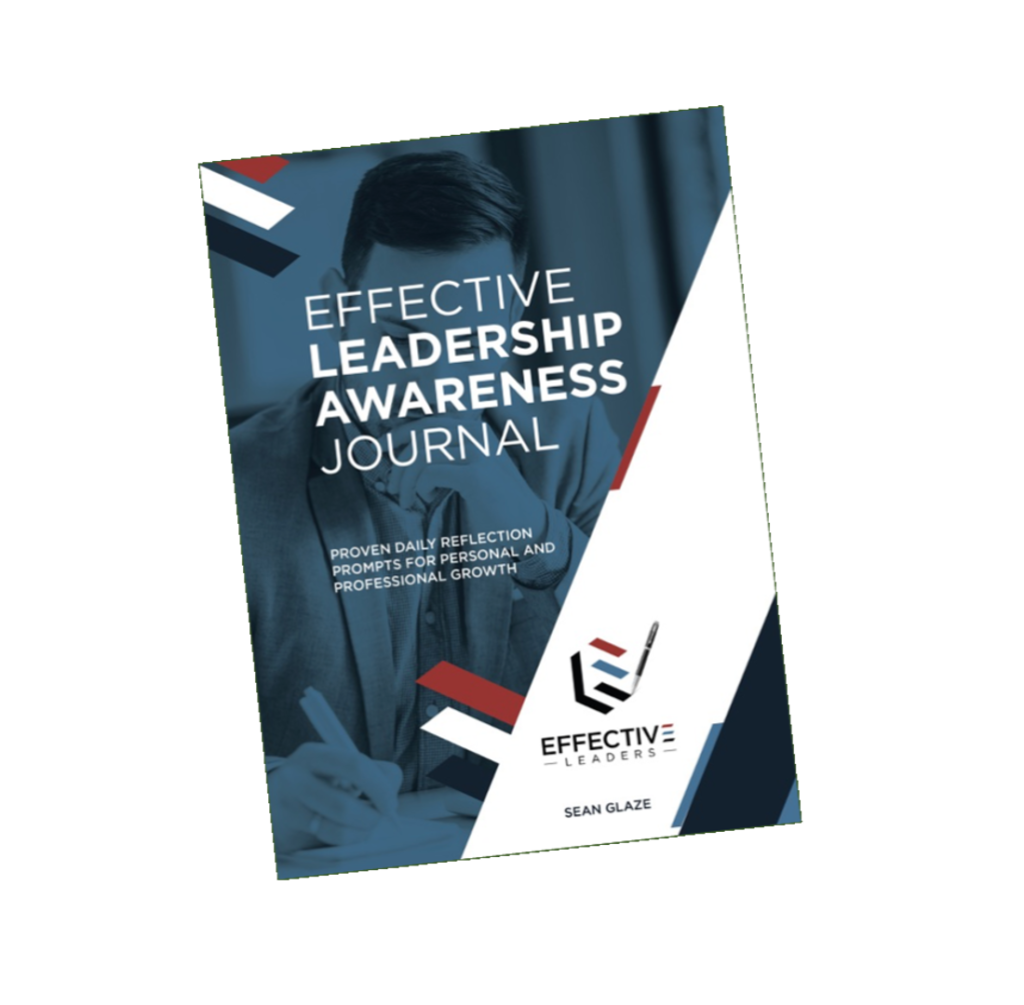Feedback questions can significantly accelerate your growth as a more effective leader.
The information you gather from coworkers and peers can provide the most valuable and actionable information that you will receive for your own professional and personal development… and it is something that you can collect more effectively…
Soliciting helpful feedback successfully and then taking action on those insights is how you will become a more effective leader more quickly.
Asking feedback questions allows leaders to gain valuable insights into their strengths, weaknesses, and areas for improvement. By seeking input from their team members and peers, leaders receive diverse perspectives and uncover blind spots that they may not have been aware of. According to a study by the Harvard Business Review, leaders who actively seek feedback from their team members are more likely to have a higher level of self-awareness and are perceived as more effective leaders.
The act of requesting feedback from others can significantly improve a leader’s performance. By soliciting feedback on specific areas such as communication, decision-making, or team collaboration, leaders gain valuable information that can help them refine their skills and approaches.
Research has shown that leaders who actively seek feedback are more likely to be rated as highly effective by their peers and employees.
And there are FIVE DISTINCT STEPS to ensure that the feedback you get allows you to move forward productively.

1 – choose the right people
Select individuals that you admire for their honesty and their insights. Don’t only look to friends… look to the thoughtful and trustworthy individuals that you have known long enough to have built a reputation and established some history.
Their perception of you from those past interactions are incredibly valuable.
2 – ask for their help to get better
Go into your feedback request conversation openly and vulnerable. Be honest about the fact that you are committed to improving your impact on the team, and explain that because you respect their perspective you would like to ask for their help in sharing what they have observed.
3- share a few specific questions
Most failure is the result of vagueness. Be sure to ask for specific areas of focus to help them be clearer about delivering helpful responses. Ask them for specific examples of the traits they may mention.
4 – take notes and be grateful
Be sure to take down what they say, so you don’t remember it differently later… Don’t allow defensiveness or emotions cloud your willingness to digest and consider their comments. And then be sure to sincerely thank them for their time and their honesty and the help they gave.
5 – follow up with what you applied
Lastly, just like any survey, the important thing is to follow through and communicate what you are going to do (or already doing) as a result of their feedback. You may not make drastic changes as a result of their ideas, but you want them to know that their time and thoughtfulness ere worthwhile and considered as you continue to try to improve your results and relationships.

By setting aside 15 minutes each day to request feedback, effective leaders create a habit of continuous improvement. This regular practice allows leaders to address issues promptly, make necessary adjustments, and adapt their leadership style to better meet the needs of their team. As a result, leaders can drive positive change and create a culture of continuous learning and growth.
To harness the benefits of feedback, leaders should dedicate 15 minutes each day to ask for helpful feedback from their team members and peers.
Here are a few useful feedback questions you can ask:
How can I better support your professional development and growth?
What specific actions can I take to improve team collaboration and synergy?
How can I leverage my strengths to help the team more than I am?
How can I create a more inclusive work environment?
What opportunities for growth and learning would you like to see?
What steps can I take to enhance the work-life balance of our team?
What are three words that you would use to describe me?
What do you see as my greatest strength?
When would you most want me on your team?
When would you least want me on your team?
What do you want me to keep doing?
What do you wish I would stop doing?
What is my most unique strength that you’ve noticed?
Do you think I’m a good listener?
Do you think I’m engaging and persuasive when speaking?
Do I get my point across clearly and convincingly?
What have I done in the past few months that helped you?
What have I done in the past few months that made it hard for you?
When have you observed me at my best? What were the conditions?
How would you describe me to a friend?
What’s one thing that you think I could benefit from learning?
If you ran the company, what’s one thing that you would do differently?
In what ways can communication between leadership, managers or staff be improved?
How could I make you feel more valued at work?
What’s one thing we could do to make you enjoy working here more?
What are other people here thinking but afraid to mention?
Which company value would you like to embody more?
Feedback request questions serve as a catalyst for leadership growth and awareness. By actively seeking feedback from team members, leaders gain valuable insights, identify areas for improvement, and strengthen their relationships.

The provided list of useful feedback questions above can guide leaders in initiating meaningful conversations that promote continuous improvement, collaboration, and personal development.
And for people seeking to gain perspective from outside their workplace and benefit from the experience of better questions and an accountability partner, an executive leadership coach can be a tremendous way to shorted your path to becoming a more effective leader.
Remember, the key to benefiting from feedback is not just in asking the questions but in actively listening, reflecting, and taking action based on the insights gained.
Asking feedback questions demonstrates a leader’s commitment to open communication and a willingness to learn from others.

The act of asking feedback questions not only drives personal and professional growth but also strengthens relationships and contributes to the overall success of the team.
– – – – –
.

Sean Glaze delivers engaging conference keynotes and interactive team building events that help healthcare and education leaders build more positive and profitable cultures.
Sean is also an author, and each of his four books, The Unexpected Leader, Rapid Teamwork, The 10 Commandments of Winning Teammates, and Staying Coachable, are entertaining parables with powerful take-aways for team growth and leadership!
What issues are YOU dealing with that would disappear if you could build a team culture that inspired connection, accountability, and a team-first attitude?
You can reach Sean via email at [email protected]

Use Connection Chats to Engineer Better Collaboration Across Every Division on Your Team

Effective Leaders Build Trust and Teamwork by Focusing on Leadership Development

The Power of a Sticky Culture in Boosting Organizational Performance and Retention

Are Your Team Standards Seen as Suggestions or Recognized as Requirements?
Books and Resources for Leaders
Check other blog
Use Connection Chats to Engineer Better Collaboration Across Every Division on Your Team
Effective Leaders Build Trust and Teamwork by Focusing on Leadership Development
The Power of a Sticky Culture in Boosting Organizational Performance and Retention
Contact Sean

Connect with Sean

Tell Sean About
Your Event
Tell Sean About
Your Event
"*" indicates required fields











